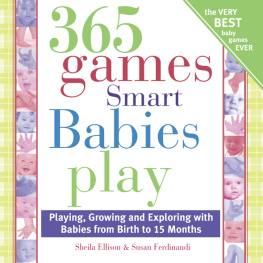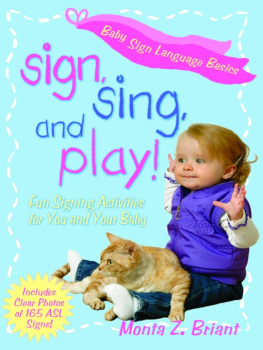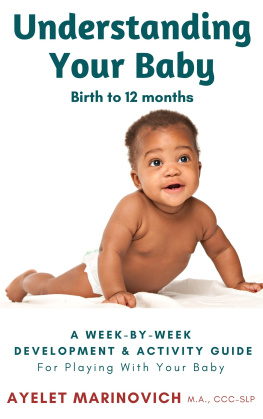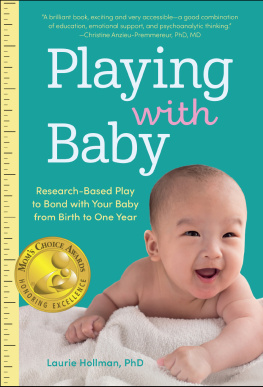InfantsDevelopment. Play. Educational games. Child rearing. I. II. II.
Title: Baby play and learn. HQ774.W36 1999 305.232dc21 98-56097
CIP Editor: Liya Lev Oertel Production Manager: Joe Gagne Production Assistant: Danielle White Illustrations: Jack Lindstrom 1999 by Penny Warner All rights reserved. No part of this book may be reproduced or transmitted in any form or by any means, electronic or mechanical, including photocopying, recording, or using any information storage and retrieval system without written permission from the publisher, except in the case of brief quotations embodied in critical articles and reviews. Published by Meadowbrook Press, 5451 Smetana Drive, Minnetonka, MN 55343 BOOK TRADE DISTRIBUTION by Simon & Schuster, a division of Simon and Schuster, Inc., 1230 Avenue of the Americas, New York, NY 10020
www.SimonandSchuster.com 03 02 01 00 99 10 9 8 7 6 5 4 3 2 1 Printed in the United States of America
INTRODUCTION
Welcome to
Baby Play & Learn. The fun and games are about to begin! Your babys most rapid period of growth and development takes place between the years from birth to three. Your baby grows
physicallyby practicing both fine and gross motor skills;
cognitivelyby increasing thinking and problem-solving skills;
verballyby acquiring receptive and expressive communication;
psychologicallyby discovering more about self-identity;
sociallyby learning how to interact with others;
emotionallyby mastering the expression of emotions.
At no other time, aside from prenatal development, does your baby grow, change, and learn more rapidly than during these early years. By providing a stimulating environment, youas a parent, teacher, or caregivercan help your baby reach his developmental potential during this critical time. Keep the following three things in mind: Your baby learns primarily through play. The best plaything for your baby is you. Have fun with your baby! Since you are the best plaything for your baby, youve got most of the equipment right on handyour face, your hands, and your body. Baby Play & Learn offers 160 specific games and activities for hours of developmental challenges and rewards. Baby Play & Learn offers 160 specific games and activities for hours of developmental challenges and rewards.
Each game and activity is based on the recommendations of a number of current child development experts. After much research in the area of babies learning and growth, authorities have found lots of ways to help kids reach their full potentialand have a good time along the way. As a child development instructor for twenty years, I know how much parents enjoy playing with their babiesall they want is more ideas for fun and games! In this book you will find Recommended ages for each game and activity. A list of easy-to-find materials needed for each game and activity. Step-by-step instructions for each game and activity. Variations for added fun and enhanced learning.
Safety tips to ensure your baby doesnt get hurt while playing. A list of skills your baby learns through play. Following are a few important points to keep in mind as you enjoy your time with your baby: Babies learn through their senses. Provide lots of stimulating materials for your baby to look at, listen to, taste, touch, and smell. Keep in mindthe best toy for your baby is one that stimulates all five sensesand thats you! Babies respond to a rich environment. That doesnt mean that you have to provide your baby with hundreds of toys. You should, however, select developmentally appropriate toys, offer your baby a variety from which to choose, and let your baby have plenty of time to play. Remember, simpler is better.
The simpler the toy, the more complex the play. Babies learn from imitation. Babies like to do what everyone else does. You play the game first, and your baby will learn from you. Be sure to use lots of body language and facial expression while you demonstrate the game, activity, or toy. Better yet, let an older child be a role model for your baby to imitate. Babies learn from different kinds of play. Games and activities help babies better understand their feelings, their fears, and their world. Babies learn from different kinds of play. Games and activities help babies better understand their feelings, their fears, and their world.
Babies like to play alone, so they can set the pace, solve their own problems, and make their own choices. with others, so they can observe other types of play, learn new ways of exploring, and become social in their play. quietly, with fingers, toes, books, music, finger toys, and language. actively, using their arms and legs to move, throw, bounce, and dance. make-believe, when they become monsters, doggies, mommies, daddies, superheroes, and cartoon characters. Babies learn from repetition. Babies love to play games over and over and over. Babies learn from repetition. Babies love to play games over and over and over.
Start with a simple task, make it fun, then make it more challenging over time, as your baby becomes better able to process information, use his body, and interact with others. Your babys favorite word will soon be Again! Babies develop through experience. Although babies begin playing and learning by watching others, being onlookers wont satisfy them for long. Your baby wants to be a doer. Get your baby involved with the environment at every opportunity. No baby is too young to take the most basic steps toward playing and learning. Babies get smarter by problem solving. Set up simple skill-building tasks for your baby to solve, and increase the challenge as your baby develops. Babies get smarter by problem solving. Set up simple skill-building tasks for your baby to solve, and increase the challenge as your baby develops.
Keep the challenges easy to solve, so your baby doesnt become frustrated and stop trying, yet challenging enough to keep your baby entertained and interested. Help your baby build small steps of success on the way to solutions. Babies learn through language. Talk to your baby while you play, and explain what youre doing and why. Babies often understand more than we think, and explaining the purpose or directions of a game, activity, or toy is a good habit. Babies enjoy language games, so make language a part of your play. Babies proceed at their own pace. Dont rush playtime or overwhelm your baby with too many options at a time.
And dont try to push too high a level of development if your baby isnt ready. Observe as your baby plays to familiarize yourself with his internal pace, then be ready to add more challenges as needed. Babies are competent when they feel confident. Give your baby lots of praise and encouragement while you play, and set your baby up for success instead of failure. Help your baby find new ways to play, solve problems, make discoveries, and learn. And have a good time! Most of all, your baby wants to play with you. The learning aspect of play is just a bonus.
So turn the page, and let the fun with your baby begin! Its Play Time!







 Library of Congress Cataloging-in-Publication Data Warner, Penny. Baby play & learn/Penny Warner. p. cm. Includes index. ISBN 0-88166-328-X (Meadowbrook)ISBN 0-671-31655-9 (Simon & Schuster)
Library of Congress Cataloging-in-Publication Data Warner, Penny. Baby play & learn/Penny Warner. p. cm. Includes index. ISBN 0-88166-328-X (Meadowbrook)ISBN 0-671-31655-9 (Simon & Schuster)